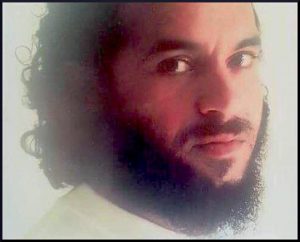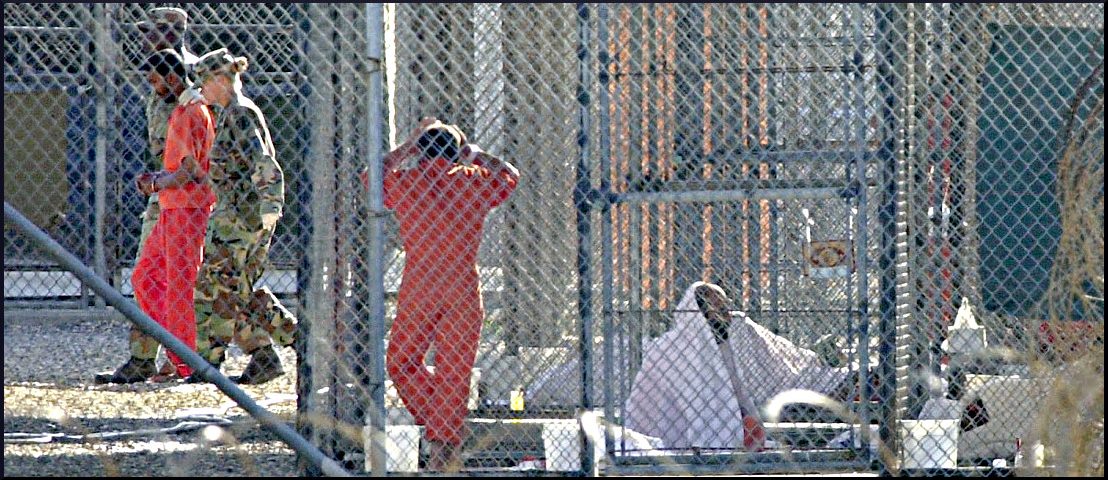By Andy Worthington, published on CloseGuantanamo.org, April 4, 2020
Most of us don’t think too much about Guantanamo any more. Yes, this article is a little out of date. The most recent writing by Haroon Gul, who is currently on a hunger strike, is a recitation of despair with suicidal undertones. I thought you would better understand where he started. [Ed]
Last week, on my own website, I published an article looking at the threat posed to the prisoners at Guantánamo by the coronavirus, following up on the alarming news that a U.S. sailor had been diagnosed with the virus, and was in isolation. My article also included a cross-post of a related article written for Just Security by Scott Roehm, the Washington Director of the Center for Victims of Torture.
Roehm pointed out that a number of the prisoners have serious underlying health problems, including Guantánamo’s oldest prisoner, Saifullah Paracha, and Sharqawi Al-Hajj, who tried to commit suicide last year, both of whom we have written about (see here and here).
Roehm also called for a number of appropriate responses from the Trump administration, beginning with letting the prisoners and their lawyers know what policies are in place to deal with the virus (if any), and also including a call for Congress to allow prisoners to be transferred to the U.S. mainland if they need urgent medical care.
Following up on the news about the sailor being infected, Guantánamo prisoner Asadullah Haroon Gul sent a message to the world via one of his lawyers, which was published by Pajhwok Afghan News.
Asadullah Haroon Gul, the pre-penultimate prisoner to arrive at Guantánamo, in June 2007, is more generally known as Haroon Gul, and was initially identified by the U.S. simply as Haroon al-Afghani (Haroon the Afghan, revealing upfront how little they knew about him).

His Guantánamo prisoner number — ISN 3148 — is a number from Bagram, not Guantánamo, showing how little the authorities thought about his significance, because, to be assigned a Guantánamo prisoner number means having an administrative review, a Combatant Status Review Tribunal (CSRT), to confirm that the prisoner in question is an “enemy combatant,” so that they can be put forward for a military commission trial.
Having a CSRT also would have meant that some information would have ended up being made publicly available about Gul, from his own statements, but instead he remained shrouded in mystery, with the only publicly available information about him coming from the Pentagon, who made some nebulous claims about him being involved with Hezb-e-Islami Gulbuddin (HIG), led by the warlord Gulbuddin Hekmatyar [Hematyar is the butcher who, early in the war, allowed some hundred prisoners to die locked in the back of a panel truck in the desert], which had, at one point, been aligned with Al-Qaeda.
Gul was held for nine years without any kind of representation whatsoever until he finally secured an attorney, Shelby Sullivan Bennis of Reprieve, who described him as a “bright-eyed, chatty young man,” after meeting him to try and help him prepare for his Periodic Review Board, a parole-type system set up under President Obama, which has, unfortunately, repeatedly refused to recommend his release, even though Sullivan Bennis told the board that,
“Having completed a two-year university program in economics and mastered five different languages, Haroon is more able than most to begin a productive and peaceful life upon release. He wants nothing more than to return to his wife and daughter, whom he feels immensely guilty for having left to fend for themselves.”
That was in 2016, and for another profile of Gul, providing additional information suggesting that he wasn’t even affiliated with HIG, see my article from 2018, entitled, Trapped in Guantánamo: Haroon Gul, a Case of Mistaken Identity Silenced By Donald Trump.
More recently, the continued absurdity of holding Gul was made clear when a former Guantánamo prisoner with HIG associations, Hamidullah, was repatriated from the United Arab Emirates, where he had been sent with other Afghans in 2016, because Hekmatyar had reached a peace agreement with the Afghan president, Ashraf Ghani. Two other men sent to the UAE, but not aligned with HIG, were also repatriated, and it seems obvious that Gul should also have been freed.
In his message from Guantánamo, Gul expressed his desire to be reunited with his wife and daughters, who are in a refugee camp, and also wrote about his fears for his fellow prisoners, specifically mentioning Saifullah Paracha, and also noting,
“I have refused three doctor visits in the last week, as at least I can refuse that if they will give me no assurance that the doctors are free of infection.” He added, “I do not fear having it myself, but I don’t want to be the one who brings it into the block. I do not want to be the one who brings Saifullah a death sentence just because I want a medical visit for myself.”
Rather than posting more from Gul’s letter from Guantánamo, I’ll leave you to read the whole of it yourself. I hope you have time to do so, and will share it if you find it useful.
A Lonely Corona-life in Guantánamo Bay
By Asadullah Haroon Gul, Pajhwok Afghan News, March 31, 2020
It is lonely facing the Coronavirus here in Guantánamo Bay. I don’t mean that in any self-pitying sense, but I am desperate to be in the refugee camp with my family. People in Europe have everything while Afghanistan cannot protect people as they are fighting for their daily life. They have enough problems, without something else like this. The doctor here told me that Coronavirus will take millions of lives. So many of those lives will be in countries like Afghanistan with such limited health care, people will not bring food to your house, the government is not going to assure you that you will get thousands of dollars a month.
This is a very real enemy, and many countries have not taken it seriously enough. As for America, the guard force here (thousands of men and women) need to be helping in other places, rather than wasting their time here.
This is now a global issue – Corona has just made its way to Guantánamo Bay, with the first soldier testing positive. We know it was probably late in the day when the soldier was identified, and nobody tells us whether he was part of the guard force who had already been into the cell blocks. There is some fear here as we cannot get away from guards. Saifullah Paracha, from Pakistan, is in his seventies and he has had two heart attacks already, so we worry particularly for him. Prisons are notorious for being places where viruses multiply much faster than in the outside world. I was joking with the guards, telling them, “I am not going to shake your hand any more!” Of course, they never do shake my hand – just roughly manhandle me into shackles and handcuffs.
I have refused three doctor visits in the last week, as at least I can refuse that if they will give me no assurance that the doctors are free of infection. I have no idea if they have it, and I do not fear having it myself, but I don’t want to be the one who brings it into the block. I do not want to be the one who brings Saifullah a death sentence just because I want a medical visit for myself. I will take the risk I know – not having medical treatment – rather than take a risk that I do not know and cannot control.
I do not think it is going to go away very fast. I watch the news and as I write this there are more than half a million people who have it. If the US does not want to release me because they think they still have the right to hold me in prison, despite all these years when they have never thought to charge me with a crime or give me a trial, they should think about my family. I know I am innocent of any crime, but my family are all innocent in the eyes of the world. All I want is to be with my family to help them.
My wife had surgery recently and she is still in recuperation. She suffers from Vitamin D deficiency, which is another vulnerability to the virus. I don’t know if she gets supplements, I wish I could get them to her. I do not want her to go to hospital too much as that is where she will catch it. People have little knowledge and understanding where she lives, and they will be spreading it all around.
My daughter Mariam is still going to school – if I was there I would teach her at home. Schools are like other institutions – she cannot stay far away from the other students, so she is going to catch anything that is in the school. If Mariam gets sick the police will take her by force and they will put her in hospital for two or three weeks. She is a child and nobody would be allowed to see her.
My parents are over 60 years old and very weak because they have had disease for too much of their lives. My mother had a heart attack when I was detained. My father is diabetic. They have all the risk factors. I worry all the time for them.
It is very hard to sit here in my solitary cell, unable to do anything about it. I wish I could be put on trial – tomorrow – even if it was with no notice and no chance to prepare. I think I would be acquitted, but at least there would be certainty. If I was convicted of something – however false – at least then I would be someone who was falsely convicted. But if I am just to rot here, unable to do anything to help, and if one of my family dies, I have no idea what my response would be. I think the coronavirus is as much a mental disease as a physical one. People panic, worrying about someone they love dying.
I listened to a doctor from Kabul talking on Voice of America saying that people are afraid of the virus, but they are more afraid of the breakdown of society. I read that in Britain people panic-bought toilet paper; that may be foolish, but it’s not dangerous. In America they went out and bought more guns. People will kill each other. Yesterday the Afghan government was asking for cooperation with the Taliban – I hope that the people will become more united as there is a common enemy to all humanity. The virus does not recognize borders, it targets everyone. But I have no assurance that my family will be okay.
In the end, if I am to help my family, President Trump surely needs to hear from President Ghani – how can you ask Afghanistan to release thousands of prisoners, if you will not release one? I do not think the public in America would have any problem with me being released from here to be with my family. The people will have compassion even if the government does not.
